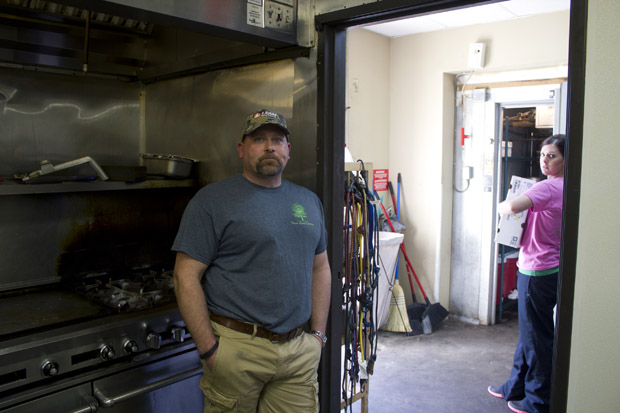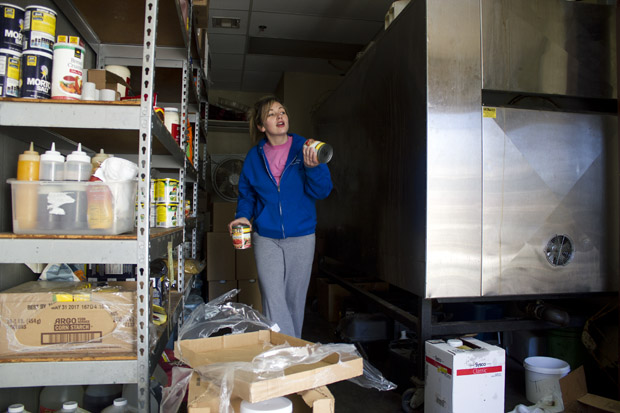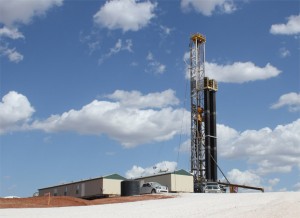Oil-field Workers and Economists in Oklahoma Hope Crashing Crude Prices are a Blip, Not a Bust
-
Joe Wertz

Joe Wertz / StateImpact Oklahoma
Chad Igo owns Pecan Creek Catering in New Cordell, Okla., which delievers food to workers in the oil patch.
The sign on the front door says “closed,” but Pecan Creek Catering in New Cordell, Okla., is open for business. Out back, a tractor-trailer is being unloaded. Giant cans of green beans, tomatoes and mushrooms are hauled inside, where they’re sorted and stacked on metal shelves.
In the kitchen, Jennifer Etris pours a carton of buttermilk into a giant bowl and stirs.
“I cheat,” she says. “I use two of these ranch dressing mixes instead of one. It is known all over the world, my ranch dressing.”
Etris makes her signature condiment in three-gallon batches. By the end of the week, it’ll all be gone, devoured by teams of hungry roughnecks, frack crews, truck drivers and tool-pushers.
“They drive in, work their seven days, eight days, staying in a hotel. They want someone to come out and treat them like they’re important,” the business’ owner Chad Igo says. “A home-cooked meal. It’s important to them. They don’t want some greasy, nasty burger from town.”
Pecan Creek used to be a café, but Igo closed the restaurant years ago to focus on catering, literally, to the oil field. The business grosses about a million dollars a year and employs about a dozen people.
“Last year, we dumped $300,000 worth of payroll into Cordell, America, and that’s something we’re proud of,” Igo says.
Oklahoma was the country’s No. 5 crude producer in 2013, data from the U.S. Energy Information Administration show. And as oil boomed, so, too, has the state’s economy. The oil and gas industry employs tens of thousands of workers directly, but Igo’s catering company — like many non-petroleum businesses across the state — depends heavily on the energy sector. All told, roughly 20 percent of all jobs in Oklahoma are linked to the oil and gas industry, studies show.

Joe Wertz / StateImpact Oklahoma
Workers at Pecan Creek Catering in New Cordell, Okla.,unload crates, cans and boxes of food and prepare for catering jobs in oil fields in western parts of the state.
Price drop brings worries
The plummeting price of crude oil — which recently sank below $50 a barrel, the lowest since 2009 — is alarming economists and state finance officials, who are projecting budget cuts and warning of potential job losses.
The crashing price of crude oil also casts a long shadow in Oklahoma’s oil field. Some energy companies, like Continental Resources, are slashing spending. Others are trying to weather what they hope will be a relatively short downturn. Workers in Oklahoma’s oil patch, like Igo, are bracing for bad news as they face uncertainty.
“We’re nervous, we don’t know. I mean, $40 a barrel oil? They won’t do it,” he says. “It’s going to catch up sooner or later, they will shut down.”
In December, Gov. Mary Fallin and other top officials met to certify tax revenues for state budget planning. Right now, estimates show about $300 million — about 4.1 percent — less than last year, and low oil prices could make that gap larger.
The Board of Equalization will look at the numbers again in February to determine how much money the Legislature will have to fund state government. If oil prices stay low, agencies could face steep cuts.
Oklahoma lawmakers are predicting a “tough budget year,” while Preston Doerflinger, the state’s secretary of Finance, Administration and Information Technology, and Treasurer Ken Miller caution that continued low oil prices could drag down nearly every tax revenue stream.
“We’re hoping that this will be a temporary, short-term drop in the price of a barrel of oil. But that’s hard to predict, so we’re being cautiously optimistic in planning,” Gov. Fallin said after the December revenue meeting. “There might be a potential slump in the economy. And we don’t think it will be a big slump, but a possible slump.”

Joe Wertz / NPR StateImpact
A Helmerich & Payne rises above the prairie near Geary, Okla.
Fewer jobs, higher wages
Economists like Mark Snead, president of RegionTrack, which provides economic forecasting and analysis for the Oklahoma Tax Commission, agree.
“The oil and gas industry is by far the largest single source of tax revenue to the state,” Snead says.
That revenue includes severance taxes on oil and gas production, the corporate taxes energy companies pay, and income taxes paid by employees and royalty owners.
“The share of earnings of workers in the state from oil and gas is actually slightly higher today than it was in 1982,” Snead says.
Right now, Snead is telling lawmakers to build the budget with $60-a-barrel oil in mind.
“We think this will continue to put downward pressure on the industry,” he says, “The industry expected to steadily contract from this point going forward.”
While Oklahoma’s economy relies just as heavily on oil and gas as it did during the 1980s bust, Snead says the state isn’t experiencing the same temporary population boom associated with drilling decades ago. Advances in horizontal drilling mean fewer wells and workers, but those comparatively fewer jobs come with much higher wages, he says.
“In the past, it was just about job creation, but what we’ve seen in recent years is really about wealth creation,” Snead says.
Lynn Gray, Economic Research and Analysis director of the Oklahoma Employment Security Commission, also expects layoffs and increasing unemployment, which he says will hit rural parts of the state particularly hard. And if high wage-earning oil industry workers lose their jobs — even in urban areas like Oklahoma City — they’ll likely have a hard time finding comparative employment in non-oil sectors, Gray says.
“I don’t know if the other industries in the state would grow quickly enough to absorb those employees that were let go,” he says.
Looking down the road
Back in the kitchen at Pecan Creek Catering, owner Chad Igo reviews his food order. Catering could be to the oil field what the canary is to the coal mine.
“We’re kings when it’s good. They love us,” he says. “But as soon as it gets tight, we’re the first one to get cut.”
Despite the low oil prices and uncertainty, Pecan Creek’s calendar is booked solid. Igo is still planning on buying a new trailer, and he bought property to expand his kitchen.
But Igo is diversifying. He also bought a building down the road in case he has to leave the oil field and get back in the restaurant business.
“That’s the long game,” Igo says. “It’s the oil business. You always need to be planning the next thing.”

